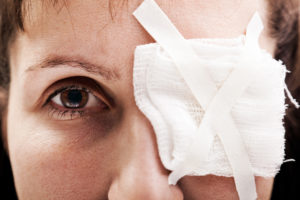
If your vision has ever been negatively impacted, you understand why. Put simply, our vision is linked to our quality of life.
Yet, as careful as we are with our eyes, they can be easily damaged. Your work environment could pose a risk. Perhaps your favorite hobby strains them or puts them in the line of danger. Or, maybe you just live with a toddler who hasn’t yet learned that eyeballs aren’t for poking.
Regardless, there are myriad of eye injuries that can occur to even the most cautious of us. The good news is that most injuries are treatable, if you know what to do and who to talk to.
Today, we’re taking a look at six of the most common eye-related issues you may encounter and what your next steps should be.
Ready to learn more? Let’s get started!
When to Seek Immediate Treatment
Some eye injuries that are not as traumatic as others, but some will require immediate medical attention. Not sure how to discern between the two? The general rule of thumb is to always call your ophthalmologist or optometrist first.
If your eye has suffered a deep puncture wound, which could occur after an accident, seek treatment as soon as possible. Waiting too long could put you at risk of permanent eye damage and long-term vision loss.
On the other hand, if your issue is more of a surface-level wound or scratch, it can likely be managed by simple at-home steps after an initial visit to the eye doctor.
Let’s take a look at a few ways you could damage your eye and what to do afterward.
Scratched Eye
A scratched eye, or corneal abrasion, is essentially a scratch on the surface of your eye. If you’ve ever felt dust or debris in your eyes and rubbed just a little too hard, you might have felt this before.
Immediately afterward, your affected eye will be red and sensitive to light. You may also have blurred vision. While you may be tempted to suffer through the symptoms, go ahead and call your ophthalmologist or optometrist. If left untreated, the scratch can become a breeding ground for both bacteria and fungus, further exacerbating the discomfort.
Preventing Further Contamination
It only takes around 24 hours for a strain of bacteria or fungi to penetrate a scratched eyeball and start wreaking havoc. This is especially the case if the offending foreign body was contaminated in any way (think: a baby’s fingernails, sticks or even dirt).
Therefore, if you have any grounds to believe you may be suffering from a corneal abrasion, talk to your eye doctor immediately.
In the meantime, resist the urge to cover your eye with a patch while you wait for your next steps. Remember, bacteria love the dark and that creates the perfect environment for them to thrive. If you can, just keep your eye closed or cover it loosely with a paper cup to create a makeshift shield.
Chemical Burn
From household cleaning products to pepper spray, there are many ways to inadvertently burn your eyes.
Sometimes, your eyes will just sting a little afterward and you can resume life as normal. Other times, you’ll need to contact an optometrist or ophthalmologist. How can we discern the difference? The answer lies in understanding the product’s chemical makeup.
In general, there are two types of burns you may have to contend with: acid and alkali. Let’s review the basics of each.
Acid Burns
While they still cause discomfort, acids carry a low pH and as such, aren’t as damaging when they enter your eye. If your eye comes into contact with an acid, it usually only affects its front portion. Yet, in some severe cases, the acid could penetrate to the cornea and even lead to blindness, so these cases should still be taken seriously.
Common household acids that may get into your eye include:
- Glass polish
- Nail polish remover
- Vinegar
- Sulfuric acid car battery
While glass polish is a commonly found irritant, keep in mind that it is actually comprised of hydrofluoric acid. Getting it in your eye is as harmful and serious as an alkali burn.
Alkali Burns
Alkali burns result from chemicals with a higher pH level. These penetrate further into the eye and can cause more damage than acid burns. While it is relatively rare to have many alkali chemicals lying around your house, they can be found in:
- Ammonia
- Lye
- Fertilizers
- Lime
- Oven cleaners
Though you’d expect an alkali burn to sting much worse than an acid one, it’s important to note that these often have a delayed onset. While acid burns will often cause your eye to become red instantly, you might not feel the effects of an alkali burn until a little later.
If any foreign chemical has entered your eye, whether by immediate contact or via your hands, you need to act quickly to flush it out. Hold your head under a stream of lukewarm water for 15 minutes, allowing the water to enter your eye. Remember to wash your hands before touching your eyelids or flushing out your eyes.
Next, call your eye doctor and explain the circumstances. Depending on the type of chemical, you may need to come into the office, or your eye doctor may be able to walk you through the next steps to take at home.
Bruised Eye
Whether you got punched in the eye or simply ran into the corner of a wall, there’s nothing pleasant about a black eye.
Immediately after impact, you’ll notice your eye and eyelid start to swell up. There will also be visible eye bruising present.
You should visit your eye doctor to make sure your eye isn’t damaged internally, but after that, you can usually manage this one from the comfort of your couch. If you notice any other symptoms, such as vision loss, blurred vision or bleeding, more advanced care will be required.
Otherwise, keep a cold compress or ice pack on the affected area to help alleviate the swelling and give it time to heal. Be careful not to press too hard on your eye and repeat this process several times a day. Once the swelling has gone down, you might find a warm or hot compress is more comfortable.
Foreign Object in Eye
While rare, there is the chance that you may get a foreign object stuck in your eye. For instance, fishermen may get a metal hook latched onto their eye while reeling in a big catch. If something shatters above you, glass shards may also become embedded in your eye.
If something like this happens, see your eye doctor immediately. You could cause further damage if you try to reach in and remove the object on your own. Also, remember not to rub your eye, as you could push the object in deeper.
This is another situation in which a paper cup eye shield can come in handy. Tape it loosely over your eye and then seek medical attention. Keep in mind that any metal bodies allowed to remain in your eye for an extended period of time can rust and create a scar.
Bleeding Eye
If you’ve ever seen someone with an eye bleed, also known as a subconjunctival hemorrhage, you may have audibly gasped. Yet, this is one eye injury that appears more serious and harmful than it usually is.
In this case, it’s helpful to understand the science behind what’s really happening. The white part of your eye is known as the sclera. It is covered by a thin, moist membrane called the conjunctiva. Within the conjunctiva are many blood vessels and nerve endings.
We don’t normally notice these blood vessels, but when our eyes become inflamed, they are more obvious. We especially notice them when a breakage occurs within one of them. This happens under the conjunctiva, hence the medical term for the injury.
There are several circumstances that could cause a blood vessel in your eye to break and leak. Common culprits include activities that suddenly raise your blood pressure, including laughing or heavy lifting. You may also experience an eye hemorrhage after eye surgery or taking blood thinners, such as aspirin.
Though these injuries look miserable, they are often painless and will resolve themselves over time. After a few weeks, the blood will clear on its own and the eye will look normal again. In most cases, no outside medical treatment is required.
Radiation Exposure
You know that spending a lot of time in the sun can damage your skin, but did you know your eyes can also get sunburned? It’s true, and it’s more common than you might think.
After a day outdoors, notice if your eyes are red, irritated, watery or sensitive to light. If so, you’ve likely been exposed to a high amount of UV radiation.
In the short-term, you need to seek relief and need to rest your eyes. In the long run, understand that routine and repeat exposure to the sun could put you at a greater risk for developing cataracts or even macular degeneration as you age.
For an immediate cool-down, try to stay indoors as much as possible, preferably in an environment with low light. You may even need to wear sunglasses as your eyes adjust. Artificial tears can help keep them moist, so you’re not tempted to rub them every few seconds.
Tips to Safeguard Your Eyes
While you can’t prevent or control every eye injury, there are a few ways you can protect your eyes and make yourself less susceptible to one.
For instance, if you are performing any kind of DIY activity at home, such as a repair project, be sure to wear protective eyewear such as safety goggles equipped with side shields. Take the same precaution when you’re handling chemicals or when you are exposed to them.
To prevent being struck in the eye from flying debris, it’s also helpful to wear safety goggles when you’re mowing the lawn, blowing leaves, playing sports and even opening a champagne bottle. Moreover, keep all sharp objects from silverware to scissors out of the reach of young children to make sure everyone in the family stays safe.
If you’re cooking, use a grease shield to help prevent hot oil splashes. At work, follow the guidelines set forth by the Occupational Health and Safety Administration (OSHA) for preventative eye safety in the workplace.
Professional Medical Care for Eye Injuries
The time right after an eye injury can be a confusing and scary one. That’s when it helps to have an ophthalmologist or optometrist on speed dial. Knowing who to talk to can take the guesswork out of the equation and help you achieve relief and attention as soon as possible.
While you may have a primary care physician, you may not have a trusted ophthalmologist or optometrist just yet. Many people treat vision care as a reactive measure after eye injuries or other issues pop up. Yet, preventative care is just as important to keep your eyes as healthy and sharp as possible.
That’s where we come in.
Our team of eye doctors is trained and experienced in a range of specialties, from dry eyes to vision disorders and a host of issues in between. Whether you are suffering from an eye injury or just want to come in for a routine eye exam, feel free to contact Magruder Eye Institute today.









